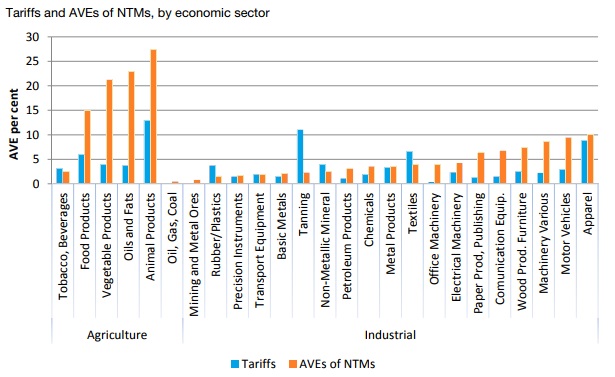News
At MC11, new report reveals that trade regulations are costlier for developing countries than tariffs

Joint UNCTAD-World Bank Group findings confirm that non-tariff measures (NTMs) affect 77% of world trade and are more important than tariffs in trade policy.
A new report by UNCTAD and the World Bank Group being launched at the WTO’s Eleventh Ministerial Conference in Buenos Aires, Argentina, on 11 December reveals that non-tariff measures (NTMs) make trade costlier for developing countries than tariffs.
NTMs are policy measures other than ordinary customs tariffs that can have a potential economic effect on international trade in goods by changing quantities traded or prices or both.
Examples might include safety regulations for machinery or toys, health regulations for food or medicines, quotas, price controls, and export restrictions.
The report is based on the updated database TRAINS 2.0, which collects comprehensive and comparable NTM data for 109 countries, covering 90% of global trade.
On usage of NTMs, the report found that:
-
NTMs affect 77% global trade
-
In general, developed countries regulate more products and a higher share of imports than least-developed and developing countries
-
Agricultural products are more often regulated than manufactured goods and natural resources
-
Technical barriers to trade (TBT) and Sanitary and phytosanitary (SPS) measures are the most frequently used form of NTMs
-
Developed countries drive the high global usage of TBTs and export measures, while the use of SPS measures is more uniformly distributed
The report also measures the impact of NTMs on trade by estimating their equivalents according to value, or ad valorem equivalents (AVEs), which makes them comparable to tariffs.
Four findings stand out:
-
NTMs are more important than tariffs in almost all sectors, but especially in agriculture where, on average, NTMs have an effect equivalent to 21% of tariffs
-
NTMs are associated with a 3 percentage-point higher cost for low income countries
-
Technical measures, such as SPS measures TBTs, matter more in high-income countries than in middle-income countries
-
Traditional trade policy measures, such as quotas and price measures, constitute a higher barrier to trade in low-income countries than in middle and high-income countries
The findings will help policymakers in developing countries determine how best to design policy schemes that enhance their integration into the global economy.
Non-tariff measures matter, on average, more than tariffs

The report is a joint work by UNCTAD and the World Bank, under the supervision of Aaditya Mattoo and Ralf Peters. It was launched during an MC11 side-event entitled Transparency matters: The unseen impact of Non-Tariff Measures.
UNCTAD sheds new light on murky trade regulations with update of non-tariff measures database
A new release of UNCTAD’s global non-tariff measures (NTMs) database, TRAINS 2.0, was presented during the Eleventh Ministerial Conference (MC11) of the World Trade Organization (WTO) in Buenos Aires, Argentina, on Monday 11 December.
The update means that the database now offers systematic and comprehensive information on 109 countries and covers 90% of world trade.
“The real untapped potential for further trade growth lies in regulations,” UNCTAD Secretary-General, Mukhisa Kituyi said. “More transparency on non-tariff measures and regulatory standards can improve regional trade and regional integration especially for small companies in developing countries.”
UNCTAD TRAINS 2.0 contains 14,561 different regulations that comprise 50,511 distinct regulatory measures. Each entry provides information on the substance of measures, and the products and trading partners subject to the measure.
NTMs are trade barriers that restrict imports or exports of goods or services through mechanisms other than the simple imposition of tariffs.
NTMs can include such regulations as packaging requirements and limits on the use of pesticides ensure safe food in our supermarkets, restrictions on toxins in toys to protect our children, and emissions standards for cars that limit climate change.
But the lack of transparency about them are at the top of the list in private sector surveys as a challenge to trade. Empirical findings confirm that they are four times more important than tariffs.
Around 80% of world trade is affected by NTMs yet information on these measures is hidden in hundreds of thousands of difficult to read or find national legal texts.
This lack of transparency has prompted some WTO members to work together on a proposal for more stringent notification requirements during the WTO ministerial conference.
The new release of UNCTAD TRAINS features customer-friendly search queries offering cross-country comparison of NTMs by sector and measure type. Users can access it through the NTM Hub and compare statistical indexes of the countries’ usage of regulatory measures for their export and import.
Moreover, researchers interested in NTMs can download for free an aggregated dataset at HS 6 digits in addition to extended dataset with additional variables.
UNCTAD has coordinated the global effort to establish a comprehensive, comparable and accessible database on regulatory measures in partnership with the:
- African Development Bank
- Latin American Integration Association
- Economic Research Institute for ASEAN and East Asia
- International Trade Centre
- National Graduate Institute for Policy Studies
- World Bank Group
- WTO




